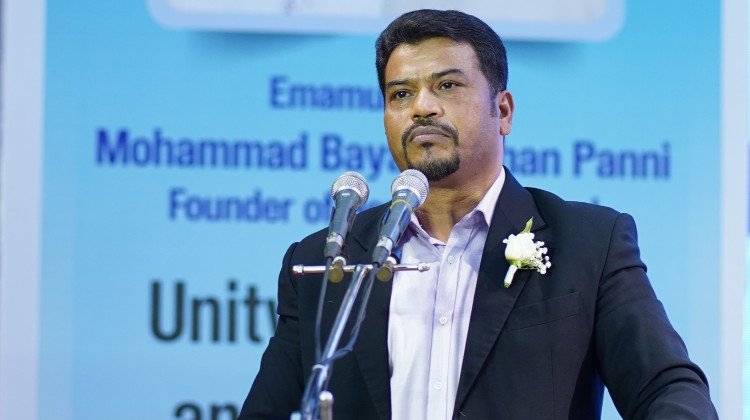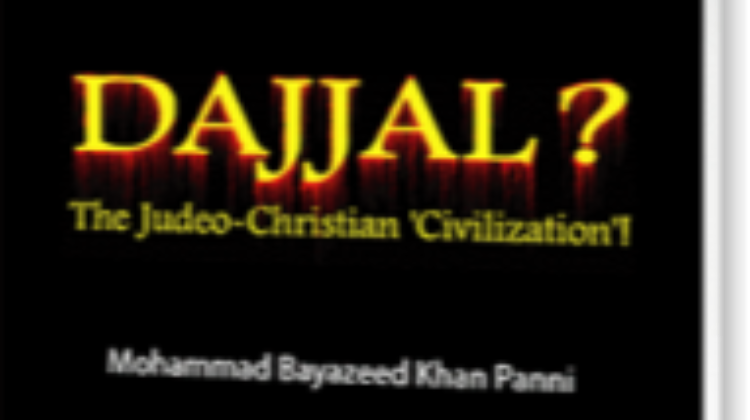Excessiveness in Religion Carried Out with Great Enthusiasm
Category :
Standing Against Extremism

Author ::
Salzar Rahman Sabu
Feb 27, 2026
visibility
470 Read
Allah entrusted His Messenger (peace be upon him) with the responsibility of establishing divine guidance and the true religion in human life (Surah Al-Fath 28, Surah As-Saff 9, Surah At-Tawbah 33).
The reason is clear—only when Allah’s true way of life is implemented, can the world be freed from injustice, oppression, war, bloodshed, conflict, and unrest. Humanity will then be able to live in peace.
After the Prophet’s demise, the Ummah of Muhammad strove with singular focus for about 60–70 years to fulfill the divine duty he left behind.
Within this short period, they established the final version of Islam across a significant portion of the then-known world. Unfortunately, this noble effort was later disrupted by deviation in purpose and belief—starting with the first distortion: excessive interpretation and overcomplication of religion.
Throughout history, after every prophet departed, their followers began interpreting and overinterpreting the faith they were left with.
This led to divergent opinions, forgetfulness of the religion’s core message, and disputes over minor rulings and fatwas. As a result, communities fractured, unity was lost, and nations were destroyed.
To prevent a similar distortion in the final religion, Allah issued a stern warning:
"Say, O People of the Book, do not go to extremes in your religion unjustly, and do not follow the desires of those who went astray before and led many others astray and deviated from the straight path" (Surah Al-Ma’idah 77).
Also, in Surah An-Nisa (4:171), Allah says: “Do not exaggerate in your religion.”
This warning does not mean not to be devout, or not to follow religion earnestly, or not to strive to be a good Muslim. Rather, the excessiveness refers to overanalyzing the commands of the religion—digging too deeply into the fine details of every ruling.
The same nation that once abandoned worldly attachments and, from the shores of the Atlantic, reached the borders of China within 60–70 years to establish truth and justice, later abandoned this mission and began focusing on extreme interpretation.
From Adam (A) to the final Messenger (PBUH), Allah sent down the same essential religion: Tawheed—belief in the One and only Lord and Lawgiver.
His command alone is to be followed. This is what Allah called “Dinul Qayyimah” (the upright, eternal religion). In Surah Al-Bayyinah (98:5), Allah says: “He has commanded nothing more than this.” Because only His laws can ensure true peace in society.
Let us now examine the Prophet’s (PBUH) own warnings about excess in religion:
“Beware of exaggeration in religion! For those before you were destroyed due to such excessiveness.” (Ahmad, Nasa’i, Ibn Majah)
“Cursed are those who are overly meticulous and split hairs in religion.” (Muslim, Ahmad, Abu Dawood)
“Do not burden yourselves excessively lest you be destroyed. The nations before you were destroyed for doing so—their ruins are found in old temples.” (Abu Ya’la, Tafsir Ibn Kathir on Surah Al-Hadid: 27)
Ibn Abbas (RA) narrates: A man told the Prophet (PBUH), “Whenever I eat meat, I feel an uncontrollable sexual urge, so I’ve decided to abstain from meat.” Immediately, a verse was revealed, warning against such extremism, and the man changed his mind.
Anas Ibn Malik (RA) narrates that a group came to ask the Prophet’s wives about his worship. After hearing about his routines, they considered their own worship inadequate.
One said, “I’ll pray all night,” another, “I’ll fast all year and never break it,” and another said he’d never marry. When the Prophet (PBUH) heard this, he said: “By Allah, I fear and obey Allah more than any of you. Yet I fast and break my fast, I pray and I sleep, and I marry women. Whoever turns away from my Sunnah is not from me.”
When the Prophet saw excessiveness, he would turn red with anger and strongly rebuke those responsible. Even when asked about necessary matters, he would answer simply. But if someone dug too deep into unnecessary details, he would get upset.
For instance, someone once asked what to do about items found on the road. The Prophet gave a clear answer. Then the man asked, “What if it’s a lost camel?” The Prophet’s face turned red in anger (Bukhari, narrated by Zaid ibn Khalid al-Juhani).
Excessive interpretation is not unique to our time or to Islamic scholars alone. It happened in previous faiths too. Their overly devout scholars destroyed the religions through scholarly overreach. One vivid example is from the life of Prophet Musa (A):
Allah simply instructed Bani Israel to sacrifice a cow.
Had they done so without question, the matter would have been settled. But they kept asking: What age? What color? Is it trained for farming? For watering? Should it be without blemish?
As each condition piled up, it became harder to find a suitable cow. A simple command became unnecessarily complicated (Surah Al-Baqarah: 67–71).
In the same way, just 60–70 years after the Prophet (PBUH) passed away, religious scholars began this exact same cycle—obsessively analyzing and fragmenting the religion. The Prophet only left behind two commands:
Obey none but Allah.
Accept no system but the one revealed by Allah and work to establish it across the earth.
Simple, clear guidance. With iron unity, his Ummah began to fulfill it, forging an unprecedented history. But like the scholars of past faiths, this Ummah’s scholars too eventually destroyed it.
This is not an attack on Fiqh or jurists. In fact, organizing and codifying Islamic rulings from Qur’an and Hadith is essential. Without it, no Muslim society can function.
If only scholars had stopped after presenting the basics and advised not to delve further into minor details, they would have served Islam immensely.
But instead, they toiled endlessly to break down divine laws and Prophetic practices into such fine details that it became almost impossible for the average person to fully follow, let alone work for establishing the religion globally.
As a result, the Ummah became obsessed with petty issues—like whether the Prophet was made of clay or light, whether his shadow appeared, whether the congregation should say “Ameen” loudly or softly, how to pronounce “Dwaallin,” what color the turban should be, the shape of the cap, or the length of the beard. None of these relate to the core of the religion. These issues only breed division.
Why did this excessiveness arise? Because the Ummah forgot its original mission—to establish Allah’s system worldwide—just 60–70 years after the Prophet’s death. The caliphate became monarchic, enjoying luxury. Some Muslims focused solely on personal purification and withdrew from social reform.
Others drowned in legal technicalities. Thus, the two essential aspects of religion—Ma’rifah (spiritual understanding) and Shariah (legal code)—were separated, crippling the religion. This excess continues to this day.
The consequences are dire. Excessiveness has caused divisions, shattered unity, and derailed the Ummah from its real mission. Instead of striving to establish Allah’s system globally, Muslims became preoccupied with performing the finest religious rituals in their personal lives.
And now, the once mighty Muslim nation is shackled in servitude. Once destined to lead, Muslims today are kicked around like a football by other nations.
If the Muslim Ummah wants to survive and reclaim its rightful place of global leadership, it must forget all internal disagreements and unite under the banner of Tawheed. They must declare once and for all: From personal to collective life, we will follow none but Allah’s laws.
And they must rise together to strive for the global establishment of Allah’s system.
Images Related to this Post
Search
Popular Post
Recent Post
Tags
Hezbut_Tawheed
Imam Hossain Mohammad Salim
Bangladesh Violence
Religious Extremism
Mob Attacks
Human Rights Violations
Minority Persecution
Rangpur Attacks
Jamaat-E-Islami
Hefazat-E-Islam
Tawheed
Muslim Ummah
Islamic Unity
Shirk
Kufr
Islamic Revival
Kalima-E-Tawheed
Obedience To Allah
Deen-Ul-Haq
Hizb-Ut-Tawheed
Ram Temple
Third Temple
Ayodhya
Jerusalem
Religious Politics
Babri Masjid
Al-Aqsa
Zionism
Hindutva
Netanyahu
Religious Hate
Muslim Unity
Noakhali Conference
Imam Salim
Islamic Movement
Shahidi Jame Mosque
Ht Members Conference
Bangladesh Religious Persecution
Islamic Reform Movement
Extremist Violence
Human Rights Bangladesh
Sonaimuri Noakhali Attack
Political Extremism Bangladesh
Faith-Based Violence
Eid Al‑Fitr
Zakat Al‑Fitr
Ramadan Charity
Islamic Social Justice
Community Harmony
Bangladesh Poverty
Islamic Economy
Sadaqah
Fitrana
Eid Unity
Arab History
Islamic Governance
Caliph Umar
Social Transformation
Women’s Rights In Islam
Justice In Islam
Political Systems
Islam Vs Democracy
Islam And Knowledge
Islamic System
Prophet Muhammad
Farewell Sermon
Hajj
Global Peace
Human Rights In Islam
Dhul-Hijjah
Arafat Sermon
Islam Vs Un Charter
Unemployment In Bangladesh
Education System Failure
Educated Unemployment
Jobless Graduates
British Education Legacy
Youth Crisis
Hezbut Tawheed Views
Bids Report
Ssc To Masters Job Race
Middle Class Dilemma
Kerani Mentality
Excessiveness In Religion
Religious Distortion
Overinterpretation Of Islam
Misguided Enthusiasm
Warnings Of The Prophet
True Islam
Spiritual Clarity
Abandoning The Mission
Chormonai Pir
Desherpotro
Islamic Reform
Persecution In Bangladesh
Religious Violence
Jamaat-E-Islami Attacks
Islamic Truth Movement
Women And Knowledge
Islamic Feminism
Gender Roles
Social Awareness
Muslim Women
Female Empowerment
Islamic History
Qur’anic Guidelines
Obeying Allah’s Commands
Islam And Suffering
Workers' Rights In Islam
Labor Justice
May Day Islam
Islamic Society Model
Chashirhat Development
Imam Hossain Mohammad Selim
Islamic Brotherhood
Fair Wages
Islamic Military Strategy
Tawheed-Based State
National Security
Qur’anic Warfare
Mujahideen
Peacekeeping
Modern Islamic Army
Military Training
Ummah Defense
Sharia Governance
Southasia
Extremism
Bangladesh
India
Pakistan
Myanmar
Jihad
Islamophobia
Radicalism
Resistance
Conflict
War
Terrorism
Proxywar
Bjp
Hasina
Ghazwa
Kashmir
Rohingya
Arsa
Militancy
Ideology
Unity
Awareness
Injustice
Arms
Geopolitics
Gaza
Hypocrisy
Taliban
Alqaeda
Afghanistan
Syria
Iraq
America
China
Russia
Media
Violence
Oppression
Nationalism
Muslim
Islam
Justice
Youth
Leadership
Sovereignty
Hezbuttawheed
Mosque
Governance
Society
Administration
Education
Military
Economy
Women
Culture
Law
Quran
Hadith
Prayer
Madinah
Baytalmal
Amir
Discipline
Khutba
Transparency
Spirituality
Training
Morality
Ummah
Prophet
Sharia
Community
Peace
Development
Security
National
Khutbah
Sabr
Zakat
Sufism
Equality
Mosquesystem
Participation
Aqiqah
Accountability
Tradition
Modernity
Ummati Muhammad
Unity In Islam
Sunnah
Islamic Teachings
Muslim World
Deen Of Islam
Security Crisis
National Unity
Political Unrest
Military Vulnerabilities
Strength
Solidarity
Disunity
Muslim Nations
Women's Rights
Rufaidah Panni
Eid Congregation
Islamic Women Empowerment
Social Justice
Equality In Islam
Momen
Kafir
Mushrik
Allah's Laws
Faith In Islam
Belief In Allah
True Believers
Kalimah
Shariah
Justice And Peace
Political Parties
Multiparty Democracy
Political Factionalism
Islamic Political System
Democracy Vs Islam
Secularism
Political Ideologies
Islamic Law
Political Vision
Governance Without Parties
Political Stability
Islamic State
Shura System
Islamic Perspective
Women’s Reform Commission
Family Law
Inheritance Law
Labor Recognition
Shariah Law
Gender Equality
Religious Opposition
Feminist Movement
Human Rights
Political Debat
Arab Society
Islamic Economic Justice
Military Transformation
Education In Islam
Judicial Independence
Accountability In Islam
Islam And Democracy
Societal Transformation
Governance Systems
Surah Yaseen
Islamic Guidance
Religious Work
Misguidance
Imam Role
Religious Commercialization
Truth And Falsehood
Religion And Society
Quranic Teachings
Ethical Leadership
Spiritual Struggle
Religious Scholars
Religious Corruption
Quranic Verses
Islamic Scholars
Prophet Muhammad (S.a.w)
Military Nation Of Islam
Sahabah
Lost Legacy
Ummah Of Muhammad
Jehad
Qetal
Islam And Violence
Islamic Leadership
State Vs Individual Struggle
Allah's Help
Islamic Reflection
Divine Support
Muslim World Crisis
Quran Teachings
Islamic Awakening
Qurbani
Bangladesh Politics
Eid Ul Adha
Islamic Sacrifice
Bangladesh Crisis
Global Conspiracy
Sacrifice
Labour Rights
Employment Crisis
Bangladesh Economy
Wage Gap
Inflation
Unemployment
Education Reform
Job Creation
Income Inequality
Post-Pandemic Economy
Eid-Ul-Azha 2025
Bangladesh Eid Congregation
Eid Prayer 2025
Women's Participation
Peace & Justice
Bangladesh Religious Events
Eid-Ul-Azha Message
Khilafah
Global Oppression
Islamic Festivals
Quranic Guidance
Spiritual Sacrifice
Ibrahim's Sacrifice
Eid Mubarak
Peace Through Tawheed
Women's Reform Debate
Bangladesh Women's Rights
Hezbut Tawheed Position
Islamic View On Women's Rights
Legal Reforms Bangladesh
Family Law Reform
Inheritance Rights
Sharia Law Bangladesh
Women's Equality
Western Influence
Religious Groups Debate
Gender Equality Islam
Islamic Social Solutions
Women's Dignity In Islam
Islamic Solutions
Beyond Politics
Labor Rights
Class Struggle
Economic Solutions
May Day Analysis
Economic Justice
Divine Accountability
Global Economic Crisis
Capitalism Vs Islam
Socialism Vs Islam
Savar Attack
Ishwardi Attack
Religious Fanaticism
Political Manipulation
Islamic Extremism
Government Response
Democratic Threats
Islamic Teachings Misuse
Radical Ideology
Communal Conflict
Radical Groups In Bangladesh
Terrorism In Bangladesh
Islamic Rights
Mosque Access
Eid Prayer
Muslim Women Empowerment
Prophet Muhammad Teachings
Women In Mosques
Women Rights In Islam
Gender Equality In Islam
Masjid An-Nabawi
Women's Role In Islam
Misconceptions About Women
Women Participation In Mosque
Eid Khutbah 2025
Islamic Sermon
Hossain Mohammad Selim
Bangladesh Eid
Qurbani Meaning
Women In Islam
Rufaydah Panni
Islamic Congregation
Female Participation In Eid
Chashirhat Eid
Palestine Solidarity
Eid Prayer Bangladesh
Women In Eid
Kushtia Rally
Gaza Crisis
Muslim Persecution
Bangladesh News
Peace Movement
Humanity
Divine Law
Social Reform
Religious Harmony
Truth
Call To Action
Palestine
Dajjal
Islamic Struggle
Mohammad Bayazid Khan Panni
Genocide
Oic
Protest
National Press Club
Rangpur Attack
Religious Reform
Karwan Bazar Protest
Terrorist Attack
Law And Order Failure
Emamht
Ht_In_Brief
Pabnaattack
Justiceforvictims
Humanchain
Politicalviolence
Legalreform
Endimpunity
Bangladeshjustice
Hezbuttawheedleaders
Demandjustice
Pabnapressconference
Policeinaction
Proposedgovernancesystem
Islamicstatesystem
Allahslaw
Economicreform
Educationreform
Capitalismcritique
Dhakaevent
Purposeofcreation
Humancreation
Khalifah
Allahsplan
Divineguidance
Adamsstory
Islamicteachings
Peaceandjustice
Sovereigntyofallah
Lailahaillallah
Islamiccreed
Aqidah
Islamicfaith
Iman
Deen
Peaceinislam
Purposeofislam
Beliefsystem
Faithandworship
Why
Escalate
Mohammad Bayazeed Khan Panni
Hossain Mohammad Salim
Religious
Extremist
Interfaith
Situation
Ultimatum
Threats
Extremist Attack
Attack
Movement
Barakat Hossain Osama
United Kingdom
Conservative Party
Donald Trump
Secular Leadership
Fanatical Populace
Fanatical
Populace
Religion
Extensive Damage
Catastrophic Flooding
High School
Urgent Help Needed
Devastated
Allah
Modus Operandi
Messenger
Believer
Messenger Of Allah
People
Human
Jame Mosque
A Cornerstone
Cornerstone
A Just Society
The Establishment
Establishment
History
Messenger Muhammad
Simple And Straightforward
Who Made
The Simple
Complex
Way Of Life
Jannah
Way To Jannah
Civilization
Religious Figures
Survive
Politics
Worship
Establish
Goals And Objectives
System Of Life
Money
Tolerance
Madness
Mo'men
Today’s
Educated
Needs
Corruption
British
Government
Democracy
Communism
Socialism
Political
Secular Education
Responsible
The Reign
Hindu
Terrifying
Slavery
Jewish Conspiracy
The Protocols Of The Elders Of Zion
Politician
Give And Take
Education System
European
Population
Mentality
Slave
Preface
Children
The Quran
The Miracle
Creator
The Creator
Creation Of Man
The Creation Of Man
Premise
First Words
Aqida
The Programme
The Messenger
Mankind
Actual
Concept Of Islam
Crossroads
Mojeza
The Call
Panni
The Author
Qur'an
Process
The Process
A Person
Tabook
The Special Three
Special
The Tabook
The Ahzab
Ahzab
Khandak
The Uhud
Uhud
The Badr
Badr
Ebadat
Ma'bud
Vicegerent
Worshipper
Aqaed
The Reasons
Reasons
Reason
Adam
Eblis
Khalifa
Angels
Adam And Eve
Adam And Hawa












Leave a Comment